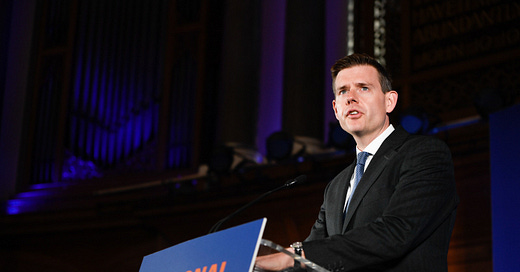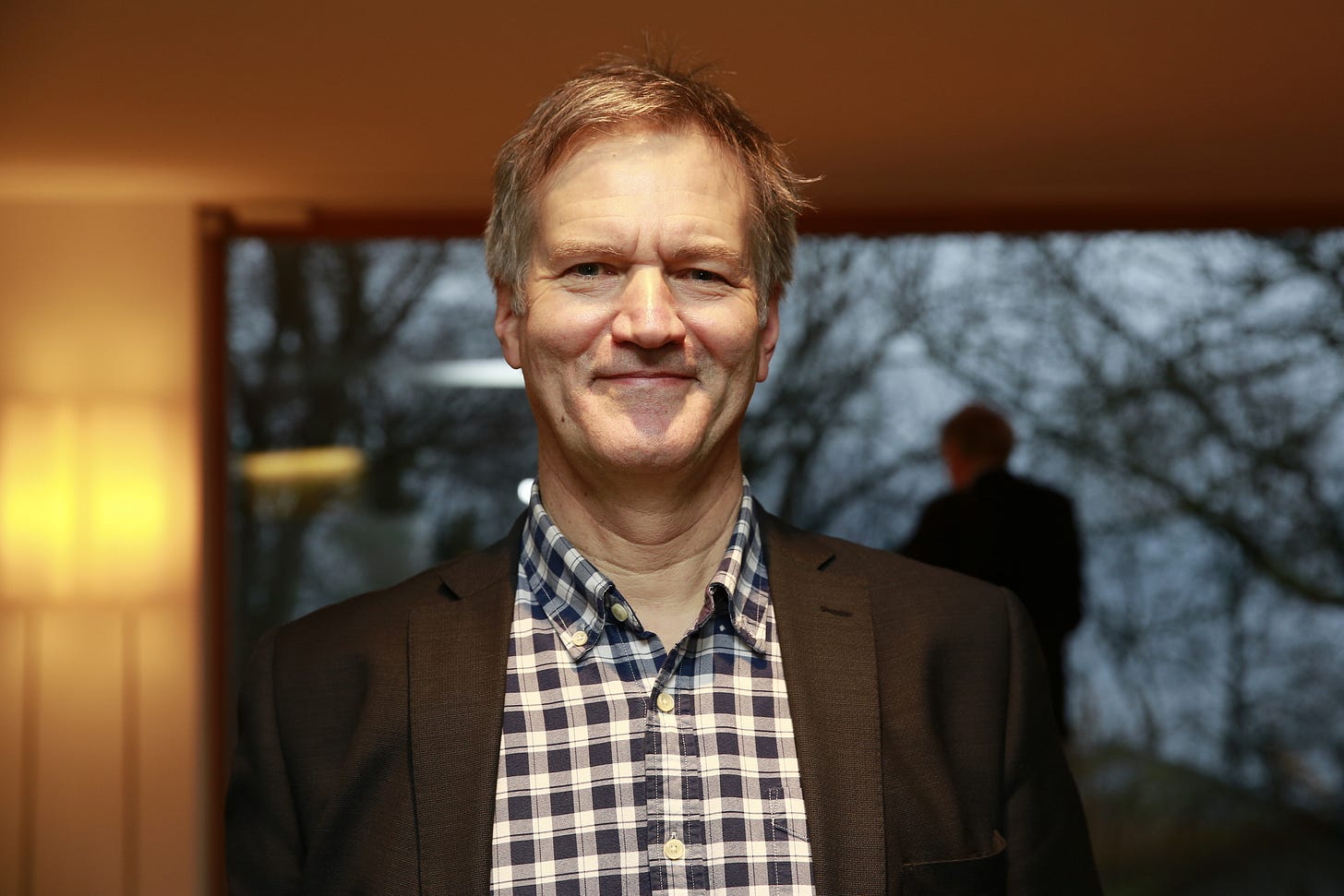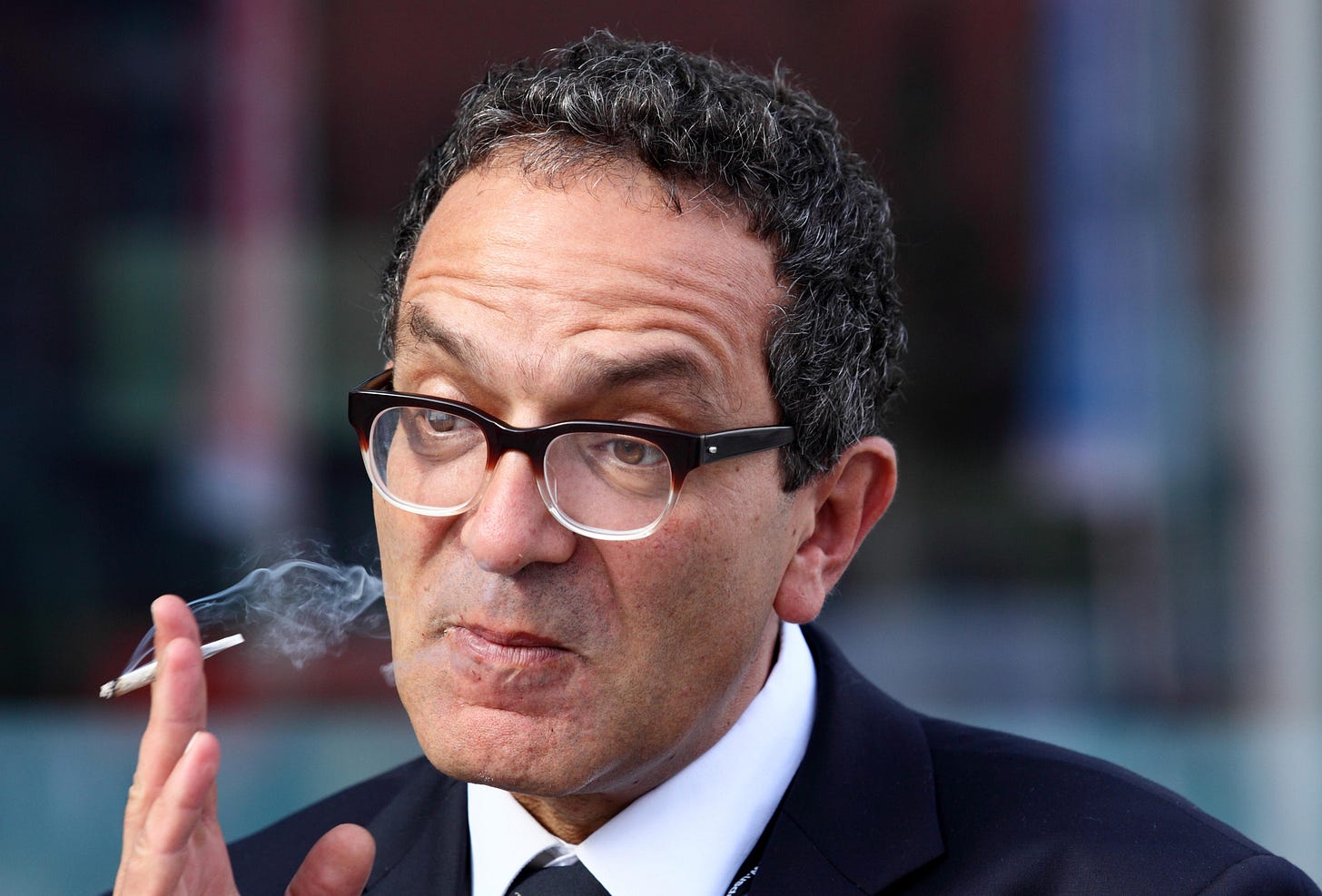Goodhart, Goodwin, Glasman and Gray: The Vanguard Spearheading British National Populism
Jon Bloomfield and David Edgar challenge the ideas of four widely read thinkers – the 4 Gs – who identify a ‘new elite’ in alliance with global capitalism against the majority
“You don’t need a mass movement to win the culture wars,” Matthew Goodwin wrote on his Substack this summer. “You don’t need a new political party. What you need is what we would call an SAS. You need a special force of a small number of highly committed, disciplined, serious people including academics, lawyers, advisors, campaigners and you basically need to focus in a laser-like way on the issue at hand.”
It appears the hard right isn’t shy of adopting the vanguardist methods of the Leninist hard left.
Goodwin is the current pin-up boy of the populist right, who complains about the exclusion of national-populist ideas from popular discourse – in the Express, Mail, Times, Telegraph and The Sun. In less than a decade, he has shifted from describing these ideas to promoting them.
In 2014, he and Robert Ford’s insightful Revolt on the Right revealed the increasing popularity of Ukip among working-class voters.
In National-Populism: The Revolt Against Liberal Democracy, written with Roger Eatwell in 2018, national populist concerns were “both real and legitimate”.
By the time his latest book was published this March – Values, Voice and Virtue – Goodwin was clearly advocating for the ideology he had begun by exposing.
Speaking to the National Conservatism Conference (NatCon) in London in May, Goodwin said the Conservative Party had squandered a “historic opportunity to realign its electorate” along the new political fault-line that achieved victory in the Brexit Referendum and the 2019 General Election. The key task for his ‘SAS’ now is to embed this new fault line in a narrative built around the idea that “a new and deeply narcissistic elite minority” is running – and ruining – the nation.
Such a move threatens to sever the alliance between the working class and the liberal middle class that brought about all the major progressive changes – from the welfare state to the social reforms of the ’60s, ’70s and ’90s – of the past 80 years.
A New Fault-Line in Politics
Goodwin is not alone in promoting the concept of a ‘new elite’.
Along with the mainstream Conservative press and countless outriders, the anti-elite ‘culture war’ special forces include three other intellectual ‘gurus’ who have had a crucial role in honing and promoting elements of this national populist narrative.
In near lockstep with Goodwin marches the former youthful Marxist David Goodhart, also a NatCon speaker, who founded the liberal-left Prospect magazine; went on to head the cross-party think tank Demos; and is now head of demography, immigration and integration at the right-wing think tank Policy Exchange.
Maurice Glasman coined the term ‘Blue Labour’ for a tendency that combined left-wing economics and social conservatism. He was ennobled on the recommendation of the former Labour Leader Ed Miliband in 2011, and immediately argued for a halt to immigration and a dialogue with the English Defence League.
John Gray is a philosopher of Hobbesian bent, hostile to the Enlightenment, and currently spending much of his energy attacking the green movement.
All four have written for the national populist-promoting Unherd site, and both Glasman and Goodwin have contributed to the equally national populist Spiked.
Gray’s main outlet is the New Statesman, and Goodwin and Goodhart often feature in the Mail. Although there are many ideological differences between them – Glasman remains a solid Labour supporter – their ideas contribute to the national populist narrative, which claims that the ‘new elite’ is in alliance with global capitalism against the majority.
Thus a new political fault line is created, pitting the alleged capitalist/liberal alliance against a new political cocktail of supposedly egalitarian policies with socially conservative values.
A Fatal Flaw in the ‘New Elite’
In his 2017 book, The Road to Somewhere, David Goodhart argues that national populism speaks to ordinary people “displaced by a more open, ethnically fluid, graduate-favouring economy and society, designed by and for the new elites”.
The book proposed a sociological distinction between internationalist, liberal, ‘anywhere’ people (particularly concentrated in the “insecure, congested, transit camp” that is London); and the majority ‘somewhere’ people with their preference for place, stability and nation.
Goodhart calculated the conservative somewheres at half the population and the liberal anywheres at about a quarter, with a class of ‘inbetweeners’ making up the rest.
For Gray, the problem is “the liberal political class”, the “liberal elites”, “the progressive bourgeoisie”, and the “alt-liberals”.
Maurice Glasman, writing a laudatory eulogy to the late right-wing philosopher Roger Scruton in the New Statesman, observed that Labour “is stuck in a globalised and liberal vision of the future, which has rendered it incapable of understanding itself or the country”.
An all-powerful ‘new elite’ that represents about 25% of the population is also identified in Matthew Goodwin’s Values, Voice and Virtue, a book the author modestly claims “will resonate across the globe”. But there is a significant sleight of hand in Goodwin’s argument, exposed in his various and frequent summaries of the alleged common beliefs of the ‘new elite’.
These include a “liberal cosmopolitan and progressive worldview”, combining support for mass immigration and “integration into supranational institutions” and cheering on “abortion, homosexuality, casual sex, prostitution, divorce, gender equality”. But, frequently, the elite is also “more economically liberal”, more “likely to view the world through an individualist lens” rather than prioritising “collective, group-based attachments”, more in favour of open markets, and the “least concerned about rising inequality”. In other words, this elite supports both economic and social liberalism, Thatcherism and Blairism.
This idea, that up to a quarter of the population supports what David Goodhart calls “double liberalism”, is crucial to the national populist contention that the liberal ‘new elite’ is on the same side as international finance capitalism. For Goodhart, “people in finance, business, the universities, the arts and the liberal professions” have “come to think of themselves as belonging to a global, borderless world” and are thus clearly opposed to people whose loyalty is to the nation-state.
The idea that financiers and business leaders share a common belief system with people in the liberal professions, the arts, and most of all the universities, is however belied by Goodwin’s own calculations. Goodwin cites research that calculates “radical progressives” – or, as he quotes John Gray describing them, “hyper-liberals” – at 13% of the population. For some sociologists, this segment is 23%. This suggests radical progressives make up between half and nearly all of the ‘new elite’ and indeed correlates with Goodhart’s anywhere people.
But, far from supporting neoliberalism, inequality and open markets, this radical progressive group leans “strongly to the left in politics”, is “strongly motivated by the pursuit of social justice”, and is most likely to believe that people’s outcomes “are defined more by social forces than by individual responsibility”. The progressives also “elevate the group over the individual”.
In other words, on the basis of his own cited figures, at least half of Goodwin’s notional ‘new elite’ are politically opposed to the Thatcherite, neoliberal economics which Goodwin claims they represent and on which his national populist narrative relies.
‘Woke Capitalism’ and the Salariat
In the real world, the graduate class – though undeniably left-leaning on social issues – is increasingly unlikely to support the interests of global finance capital.
Over the past half-century, the decline of traditional industrial employment has led to a vast growth in white-collar and office jobs in technical, administrative and supervisory roles, along with the expansion of public services in education, health and social care. The outcome has been an expanding labour force with a larger proportion of the working-age population employed than ever before. These are the social strata – largely graduates – whom Goodhart, Goodwin, and the wider national populist punditry caricature as the ‘new elite’.
Yet, in reality, the economic problems facing the salariat – falling real wages, insecure working conditions, higher housing, and energy costs – are similar to those facing other workers. Why else have half a million teachers, a million nurses, doctors and health workers and more than 200,000 university staff been engaged in strikes and industrial action over the past year? This characterisation of the salariat as the ‘new elite’ is misleading and deliberate. It is a central goal of the national populists to split manual workers from mental workers and the 4 Gs are key exponents of the strategy.
At the same time, they ignore the genuine power elite. Goodwin and Gray never mention the real bourgeoisie – the 1% of global movers and shakers, the media moguls, hedge fund managers, and directors of the new commercial giants such as Facebook, Google, Amazon, Apple, and Microsoft.
Goodhart does at least recognise the existence of a power elite – the ‘global villagers’ – whom he describes as a subset of the anywheres, accounting for about 3% of the population. But like his counterparts, he fails to shed light on the concentrated class power that they hold. Most revealingly, none of the quartet ever addresses the huge influence and clout wielded by billionaire press owners and their role in promoting populist politics pioneered by Berlusconi in Italy, and still pursued by Bollore in France, and Murdoch in the UK and US. In sum, their class analysis doesn’t stack up.
And what is the aim of this spurious ‘new elite’?
In Values, Voice and Virtue, Goodwin doesn’t say – beyond the generalisation that it wishes to push through “a revolution which reflects their values, interests and priorities”. However, elsewhere, he advances the national populist, conspiratorial narrative that what John Gray calls “the woke bourgeoisie” don’t just believe the same things, but are actually acting in alliance with international big business – a syndrome of which ‘woke capitalism’, businesses supporting liberal causes, is but one example.
Hence Goodwin’s argument in the Mail that “multinational firms” are “indulging in ‘woke capitalism’ whereby they voice strong support for the new belief system while doing all they can to avoid paying a fair share of tax and doing more for their working-class employees. The end result is a sort of informal alliance between white elites, corporations, and minorities against the white working class”.
In National Populism, Goodwin (and Roger Eatwell) describe the Hungarian version of the aims and objectives of the ‘new elite’ – particularly with regard to immigration – in greater detail. “Elsewhere in Europe, national populists like Hungary’s Viktor Orbán argue that liberal politicians within the EU, along with the billionaire Hungarian-Jewish financier George Soros, are engaged in a plot to flood Hungary and ‘Christian’ Europe with Muslim immigrants and refugees, which they see as part of a quest to dismantle Western nations and usher in a borderless world that is subservient to capitalism.”
The next page states that some of these claims are “not entirely without credence”.
A Cultural War Against Modernity
These attempts to distort a changing economic and social world to ally progressive graduates with big business are complemented by a relentlessly anti-modern cultural story.
Each form of national populism has its own distinctive mix of nostalgia, family, and fundamentalist religion: in Hungary and Poland, there is a religious focus on the nuclear family and hostility to LGBT rights; it’s similar with Meloni in Italy; while in the US, the emphasis is on abortion.
In the UK, this revolves around a cultural nostalgia for an age when women stayed at home, Britain ruled an empire, and universities were the preserve of the few. For a long time, these views were restricted to those attracted to Enoch Powell and Roger Scruton, but economic and social upheaval has brought cultural change in its wake.
The clearest explanation of this political shift was made by Conservative Home founder and Times columnist Tim Montgomerie in Prospect when he argued for a “social Thatcherism”, rebalancing “from a Conservatism of freedom to a conservatism of locality and security”, arguing that, within the Conservative Party, “the magnetism of national sovereignty” needs to overtake “the magnetism of free markets”.
John Gray’s summation of the same thought in the New Statesman was that “Britain needs a Conservative Party that prizes social cohesion over economic expansion”.
But the most urgent and pressing issue for the national populists is immigration. On this, David Goodhart has led the charge for nearly 20 years.
In 2004, he wrote in Prospect that “to put it bluntly, most of us prefer our own kind”. Two years later, in a Demos pamphlet called ‘Progressive Nationalism’, he argued for banning veiled women from public buildings, alongside a two-tier welfare system, the teaching of imperial history in schools, and the reintroduction of national service. In 2013’s The British Dream, he claimed that the increase in immigration under the 1997-2010 Labour Government could be blamed on a government wanting to suppress working-class wages and to “rub the right’s nose in diversity”.
For Goodhart, the problem with immigration is not economic but cultural: as he writes, a “meaningful” community “excludes as well as includes”. Hence, Goodhart’s insistence in 2018 that the Government’s ‘hostile environment’ strategy “should not suffer collateral damage” from the Windrush Scandal.
The newly ennobled Maurice Glasman, in April 2011, suggested that immigration “undermined solidarity, it undermines relationships, and in the scale that it’s been going on in England, it can undermine the possibility of politics entirely”. A week later, he suggested talking to the English Defence League, and later that year he told the Telegraph that “Britain is not an outpost of the UN. We have to put the people in this country first”. Asked if that meant a stop to immigration, Glasman answered “yes”. (Glasman later admitted that his three 2011 interviews betrayed “crassness and thoughtlessness”).
For Goodwin, cultural opposition to immigration has become an ever-increasing preoccupation. In a recent Substack, he argued that support for immigration is one of a number of “luxury beliefs” held by his ‘new elite’ whose “now total embrace of woke ideology and gender fluidity” is “rapidly eroding the shared history, national identity, culture and symbols, such as cricket, which the majority cherish”. Another recent Substack claimed that the Government, encouraged by a “Charity-Judicial Industrial Complex”, had left millions “with a palpable sense that the country they love, the culture, traditions, and ways of life they love, are being completely reshaped” by mass immigration.
The Climate Emergency and Higher Education
Increasingly, the threat from the climate emergency is another “luxury belief” held by the ‘new elite’ which is becoming prominent as a target.
Spiked and Unherd both used the COP26 UN climate change conference as the occasion to attack the climate change agenda.
Describing the Green New Deal as an “illusion” and an example of “bourgeois environmentalism”, John Gray has attacked “the dangerous conceits of the green revolution”. Matthew Goodwin, too, claims climate change for the woke agenda – advising Rishi Sunak to tell voters that “we need to help people get through the current crisis by slashing net zero costs and, while we’re at it, other unnecessary and costly woke policies like diversity, equity, and inclusion programmes”. He has also described an alleged “net zero backlash” as “the next big populist revolt” against the “elite”. It appears from recent Government plans to roll back climate change policies, that it is taking Goodwin’s advice.
There is also an unsurprising national populist target which has been eagerly taken up by the Government. As the most often cited characteristic of ‘new elitists’ is being a graduate, it’s no surprise that national populists would like to reduce the size – and thereby influence – of the institutions which produce them. In The Road to Somewhere, David Goodhart declared that the university sector “has expanded far beyond any useful purpose”. His 2020 book, Head, Hand, Heart, consisted of a sustained attack on the expansion of universities and the “psychological impact on those not going to university”.
John Gray, in the New Statesman in 2020, criticised the “over-enlarging of the university system” – not least because it has led to “progressivism” becoming “the unthinking faith of millions of graduates”; universities now being, of course, “centres of censorship and indoctrination”.
No surprise, then, that Prime Minister Rishi Sunak declared in July that students are being sold a “false dream” on low-quality courses and announced that the universities’ watchdog would be allowed to cap student numbers for courses on which graduates don’t go on to professional jobs in sufficient numbers.
Unpopular Populism
The arguments of these culture warriors continue to appeal to the Conservative press and to influence the upper echelons of the Tory Party and the Government. In all these areas where national-populists have led the way, Rishi Sunak has followed. Despite assurances last summer that he had ‘zero interest’ in fighting a so-called culture war, the allegedly social-liberal Sunak trumpeted a socially conservative agenda insisting that “sex means biological sex”, attacking “left-wing agitators” who “take a bulldozer to our history, our traditions and our fundamental values”, and – as Prime Minister – focusing on refugees and asylum seekers, nationalism and crime.
Despite the barrage of culture wars propaganda, detailed opinion polling data indicates that on both race and wider social issues, public opinion has been moving in a progressive rather than conservative direction. The annual British Social Attitudes survey shows that prejudice against immigrants, mixed-race, and gay relationships, and sex outside of marriage has fallen sharply since its polling began in 1983. An international study in April, by the Policy Institute at King’s College, confirms this general liberalisation – finding that “Britons have also become much more comfortable with having neighbours who belong to historically marginalised groups, such as gay people, those of a different race, immigrants, and people who have Aids”.
And so the national populists are hankering for a world that is disappearing.
But all the signs suggest that, here and across the US and Europe, the populist-right will continue its culture war agenda.
Goodhart, Goodwin and Glasman place immigration at the centre of the ‘new elite’ project – all 4 Gs see Brexit as a great opportunity for a renewed UK; and Goodwin believes that the liberal elite is conspiring with multinational companies and minorities to do down the white working-class.
Goodwin increasingly sees himself as the commander of a crack ‘SAS’ spearhead, leading his serious, disciplined warriors into battle. His Substack recently advocated the creation of a new party with a five-point policy platform: “get serious about tackling” crime; “do whatever is necessary” on immigration; Woke Political Correctness – “strip it all out”; “promote Britain’s distinctive identity, culture and history”; and “economic populism” (attacking “big global corporates”, “systematic tax avoidance” and “obscene executive pay”).
As national populism continues to tempt a Conservative Party desperate to stave off electoral catastrophe, the dangers of more authoritarian, extreme nationalist policy proposals become ever more likely.
Across Europe and America, the ‘new elite’ narrative – with its increasingly conspiratorial overtones – is being promoted by the shock troopers of the culture wars, risking the social and cultural gains of decades past. Progressives must rebuild the pluralist coalition that did so much good and fight back.
Jon Bloomfield is a writer, environmental practitioner, and author of Our City: Migrants and the Making of Modern Birmingham. David Edgar is a playwright and commentator, whose recent work includes an autobiographical solo show, Trying it On. In the 1980s, both were on the editorial board of Marxism Today










Jon Bloomfield & David Edgar admirably demonstrate the self contradictory, non-rational basis of this strange and strained emanation of right wing culture wars. I wonder if Azeem Rafiq is within Goodwin's notion of "national identity, culture and symbols, such as cricket, which the majority cherish”.
If the far-right wants to start using the same techniques as the hard-left, then I say carry on, great, go for it. The hard left has been a miserable group of opinionated failures for many years, and their tactics are clearly unsuccessful. The more the far right copy them, the better.
Of course there are dangers, but it seems to me that the Great British Public (said with considerable mirth) have seen far too much of the consequences of neoliberal nonsense in the last 13 years, and are in no mood for more of it.
Keir Starmer should be really cautious about allowing his approach to go too far in that direction.